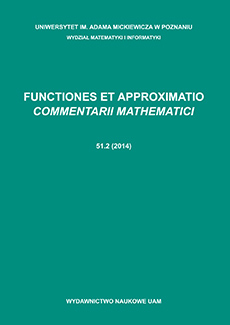Abstract
Let $\theta$ be a Salem number. It is well-known that the sequence $(\theta^n)$ modulo 1 is dense but not equidistributed. In this article we discuss equidistributed subsequences. Our first approach is computational and consists in estimating the supremum of $\lim_{n\to\infty} n/s(n)$ over all equidistributed subsequences $(\theta^{s(n)})$. As a result, we obtain an explicit upper bound on the density of any equidistributed subsequence. Our second approach is probabilistic. Defining a measure on the family of increasing integer sequences, we show that relatively to that measure, almost no subsequence is equiditributed.
Citation
Christophe Doche. Michel Mendès France. Jean-Jacques Ruch. "Equidistribution modulo 1 and Salem numbers." Funct. Approx. Comment. Math. 39 (2) 261 - 271, December 2008. https://doi.org/10.7169/facm/1229696575
Information





